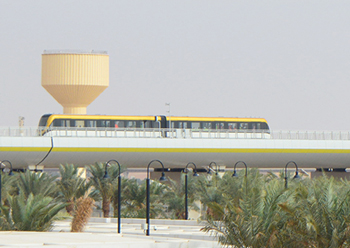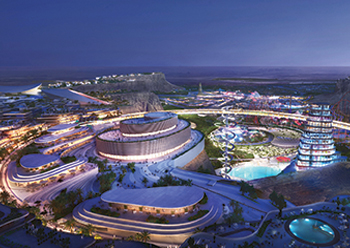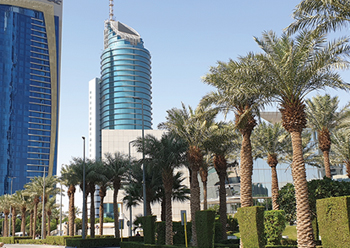‘We shall overcome’
The novel coronavirus outbreak and the historic low oil prices have certainly been a blow to the kingdom’s drive to go full steam ahead with its Vision 2030 ambitions. However, Saudi Finance Minister Mohammed Al-Jadaan believes that the country has the capacity to deal with the crisis and its impact on the economy.
01 May 2020
The entire world is in limbo right now. A totally unexpected scenario created by the microscopic novel coronavirus has shaken the foundations of the best economies of the world and brought the mighty to their knees.
Saudi Arabia and other oil producers are facing a double whammy – the economic downturn brought about by the Covid-19 pandemic on one hand and the record low oil prices caused by oversupply in the market on the other. Oil prices – on which the Saudi economy is hugely dependent – have suffered a catastrophic drop in recent weeks to hit historic lows.
And only the bravest would predict how long the current Covid-19 crisis will last and to what extent it will impact all sectors of the economy.
 |
|
Riyadh Metro ... a phased opening is envisaged. |
However, there are some comforting words from Saudi Arabia’s Finance Minister Mohammed Al-Jadaan. He has asserted that the kingdom has the capacity to deal with the crisis and its impact on the economy. The minister said the kingdom has gone through many crises and has managed to overcome them by diversifying the economy.
Also, in a positive step, construction work has been allowed to resume in the kingdom and this move will reduce project delays.
To help relieve the pains, the kingdom made available a $32-billion (SR120 billion) emergency fund in late March which included an $18.66-billion set of initiatives which exempt and postpone government dues.
No doubt, projects will be delayed or cancelled to meet the extraordinary challenges facing the economy. The government has already announced measures to reduce spending in the public sector and on development projects, to redistribute government spending to ensure that it is spent on the most necessary needs. In its bid to face the Covid-19 challenges, Saudi Arabia has announced plans to cut spending by five per cent, or about $13.3 billion.
A major blow to the construction and other sectors that serve the oil and gas industry is understandably Saudi Aramco’s plans to reduce its capital spending for 2020. The company expects capital spending for 2020 to be between $25 billion and $30 billion in light of current market conditions and recent commodity price volatility, compared to $32.8 billion in 2019, a Reuters report said. The Saudi oil giant had a capital expenditure of $32.8 billion last year and $35.1 billion in 2018, said GlobalData, a leading data and analytics company.
 |
|
Qiddiya ... aiming to be world’s largest entertainment city. |
The kingdom was among the first countries in the region to initiate stringent measures to contain the spread of Covid-19. It introduced a lockdown in several provinces and only late last month lifted the curfew from 9 am to 5 pm effective until May 13. Construction companies and factories are now allowed to resume their activities without restrictions on time, according to the nature of their business, said the state news agency SPA.
However, as Mazen Alsudairi, the head of research at Al Rajhi Capital, said, sectors such as construction would already be under pressure with Ramadan, which usually witnesses a slowdown of construction activities, and hence were unlikely to benefit from the decision. He added that he expected only a slight improvement in revenues for the manufacturing sector, especially those producing construction-related goods.
According to a report by leading global real estate consultancy Savills that analyses the impact on the market, Saudi Arabia faces a precarious situation due to the declining global oil demand, plummeting oil prices and the pandemic spreading globally. In the short-to-medium term, economic growth is likely to remain muted. As per latest estimates by Oxford Economics, non-oil growth is forecast to grow at 0.7 per cent (from 2.8 per cent previously) in 2020.
This may have a negative impact on real estate activity in the country in the immediate future as expansion plans and market entry strategies may be postponed, said David O’Hara, the head of Savills Saudi Arabia.
Until the unfortunate turn of events due to the coronavirus, however, the going was good in Saudi Arabia over the past year. Mega projects had been announced and embarked upon with rapid succession, in line with Saudi Arabia’s ambitious Vision 2030 programme. Most of these projects aim to capitalise on the kingdom’s recent moves to open up its entertainment and leisure sector to cater to Saudi Arabia’s largely young population and encourage domestic tourism, while enticing private sector investment.
Some of the big-ticket projects include the mammoth $500-billion Neom City project in the northwest, which takes in three countries – Egypt, Jordan and Saudi Arabia; the $17-billion Diriyah Gate; the Qiddiya entertainment hub off Riyadh; the Amaala luxury wellness destination; The Red Sea Project, a mega luxury tourism project, which will see more than 50 islands being developed; the Sharaan mega tourism projects in the Al Ula region; the four ‘grand projects’ for Riyadh, namely King Salman Park, Sports Boulevard, Green Riyadh and Riyadh Art; and a new amusement park in the Eastern Province.
According to a report by the US-Saudi Arabian Business Council (USSABC), 2019 ended as the highest grossing awarded contracts by value since 2015. The strong rebound in construction activities during 2019 resulted in SR197.1 billion ($52.36 billion) in awarded contracts, marking an impressive 95 per cent increase over 2018. The kingdom’s drive to enhance both physical and social infrastructure capabilities through numerous Vision Realization Programs (VRPs) was evident in 2019, said the report.
“The VRPs such as the Quality of Life Program, Housing Program, National Industrial Development and Logistics Program, Public Investment Fund Program and others have provided the investment boost needed to support the kingdom’s economy through targeted approaches. These VRPs have revived the construction sector as the magnitude of physical and financial commitments to achieve these targets were realised in 2019 and are expected to continue fuelling the kingdom’s investments into the future,” stated Albara’a Alwazir, Economist at the USSABC.
The value of awarded contracts during the fourth quarter of 2019 reached SR35.3 billion and although this was 26 per cent lower than the SR12.5 billion awarded in Q3 of 2019, it represented a 34 per cent increase compared to Q4 of 2018.
The real estate emerged as the sector with the largest value of contracts awarded in the fourth quarter, after the oil and gas sector led the previous three quarters. With the oil and gas sector in the second place, the water sector surged to rank among the top three spots. These three sectors accounted for approximately 74 per cent of all awarded contracts, as the oil and gas and real estate sectors maintained their top positions throughout 2019. Other significant contributors were the power, petrochemicals, and transportation sectors.
The real estate sector was the recipient of numerous contracts throughout 2019, with particular emphasis having been on the residential market. During 2019, the real estate sector accounted for approximately 16.5 per cent or SR32.5 billion of the total SR197.1 billion in awarded contracts. According to the USSABC report, this was the highest since 2015 when it had touched SR81.3 billion.
The construction sector’s contribution to GDP rebounded into positive territory in 2019 after seeing negative growth over the last three years, said the report. The kingdom’s construction sector’s contribution to GDP rose to 4.6 per cent compared to 2018, the highest growth rate since 2014. This growth was supported by stronger non-oil and private sector contribution to the GDP, which grew by 3.31 per cent and 3.78 per cent, respectively. The non-oil and private sectors witnessed the highest growth rates since 2014 as well. In line with the core objectives of Vision 2030, the private sector has had an active role in 2019 as more projects were awarded by private companies, the report stated.
Transport
Saudi Arabia has major ongoing and proposed projects in the transportation sector ranging from plans to expand its network of domestic and international airports and ports to development of a hyperloop system. Metro systems have been planned for key cities of the kingdom with the most ambitious development being the $22.5 billion Riyadh Metro, which is nearing completion.
Infrastructure works on the metro have reached an advanced stage, with work this year having made headway on the depots and signalling installations and testing of trains on the metro network, which consists of six lines with a total length of 176 km. The overall development is being spearheaded by Royal Commission for Riyadh City.
Meanwhile, significant developments have taken place on the ambitious hyperloop programme planned for the kingdom. In early March, Saudi Arabia’s newly established Ministry of Investment (formerly Sagia) awarded a trade licence to Virgin Hyperloop One (VHO), thus marking a significant milestone for the California-based developer in its pursuit to commercialise the technology. Under the agreement, VHO will examine viable routes, expected demand, anticipated costs and explore socio-economic impacts. This comes following a recent announcement by the Ministry of Transport and the Public Transport Authority to conduct the world’s first hyperloop study on a national level. The study will serve as a blueprint for future hyperloop projects.
A hyperloop system would see passengers travel at speeds exceeding 1,000 km/h, cutting the travel time from the capital Riyadh to Jeddah to 46 minutes.
Mega Realty Projects
The northwest of Saudi Arabia, Riyadh and Makkah are currently the magnets for real estate development.
Some of the kingdom’s most ambitious projects including the $500-billion futuristic Neom City, Amaala and The Red Sea Development are earmarked for the northwest. Early this year, Neom signed an agreement with the UK-based Solar Water Limited for the construction of the first desalination plant with ‘Solar Dome’ technology, which promises to revolutionise the water desalination process. Work on the first “solar dome” is expected to be completed by the end of 2020.
The Red Sea Project has made impressive progress over the past year with work currently under way on raising the ground level and ground compaction works (see Page 35). The ‘uber-luxury’ wellness tourism destination Amaala has signed up masterplanners for its three communities and is looking to launch Phase One later this year.
The Riyadh province will host Qiddiya, which aims to be world’s largest entertainment city by 2030; Widyan, which is looking to host the world’s largest mixed-use entertainment and shopping centre development of its kind; and Diriyah Gate Project, which is being designed to restore the historical area to its ancient glory in the 18th century to position it as a local and international tourist destination.
Power & Water
Saudi Arabia has been making concerted efforts to press ahead with its renewable energy programme. The Renewable Energy Project Development Office (Repdo), which is part of the kingdom’s Ministry of Energy, Industry, and Mineral Resources, has recently received bids for projects within Round Two of its National Renewable Energy Program (NREP), which includes six solar power schemes with a total photovoltaic (PV) capacity of 1.47 GW. Round One was launched by the Saudi organisation in 2017 with key projects including the 300-MW Sakaka solar PV project, now connected to the national electricity grid, and the 400-MW Dumat Al Jandal wind project, currently under construction. This was followed by Round Two launch in July last year.
Request for qualifications (RFQ) were also issued for Round Three of the NREP, which comprises four solar projects with a combined generation capacity of 1,200 MW. Round Three projects include the 80-MW Layla, the 120-MW Wadi Al Dawaser, the 300-MW Saad and the 700-MW Ar Rass solar PV projects.
Saudi Arabia’s privatisation drive has now been introduced to the sewage sector, with work having begun on the kingdom’s first independent sewage treatment plant project (ISTP), located in Dammam, with a designed capacity of 350,000 cu m per day and an initial capacity of 200,000 cu m per day. Other ISTPs are being planned for Buraydah, Tabuk and Madinah by the Saudi Water Partnership Company (SWPC).
Outlook
The many downside risks that are at play for 2020 could impact spending in the construction sector, according to the USSABC report. The oil sector has been under pressure since the coronavirus spread beyond China to become a global pandemic. The 2020 budget assumed oil would trade closer to the $60 range per barrel, reflecting a rational estimate at the time. However, Brent crude is currently trading at around $20 as global demand has waned. This coupled with the challenge of containing the coronavirus will be the biggest headwinds faced by the kingdom in 2020, said the report.
The pipeline of mega-projects in the kingdom will continue to fuel the construction sector. However, the challenges posed by the pandemic and depressed oil prices will impact the pace of awards.
The USSABC expects the residential real estate sector – as part of the housing programme (Sakani programme) Sakani programme under Vision 2030 – to continue to be a major contributor to the total value of awarded contracts in 2020, in line with the goal to increase homeownership among Saudi citizens to 60 per cent.
Among the latest developments launched under the Sakani programme this year are two new residential projects in Jeddah in partnership with the private sector, which on completion, will provide a total of 8,083 housing units.
- ‘We shall overcome’
- Red Sea wonder!
- Purity at its heart
- Ports set to expand
- Saudi Projects at a glance



